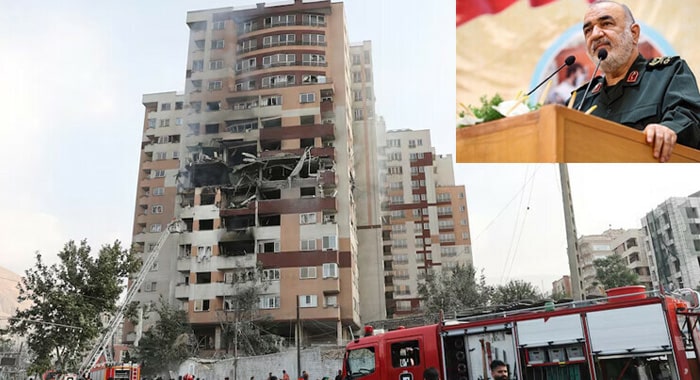In a dramatic escalation of hostilities, Israel has launched a wide-scale military offensive against Iran, targeting key nuclear and military installations in what it has described as the opening phase of a sustained operation to halt Tehran’s nuclear ambitions. The strikes have resulted in the confirmed deaths of senior Iranian military and nuclear officials, including Major General Hossein Salami, Commander-in-Chief of the Islamic Revolutionary Guard Corps (IRGC), and prominent nuclear scientists Dr. Mohammad Mehdi Tehranchi and Dr. Fereydoon Abbasi.
Iranian state media and eyewitness reports confirmed that the attacks also struck residential areas in Tehran, resulting in civilian casualties, including women and children. Images circulating on social media and Iranian television showed destroyed buildings and smoke rising across the capital.
Supreme Leader Ayatollah Ali Khamenei, in a televised address to the nation on Friday morning, condemned the Israeli assault and vowed severe retaliation. “The Zionist regime has committed a grievous crime on our soil, targeting our cities and civilian homes. They must now await a bitter and painful fate,” he warned. Ayatollah Khamenei acknowledged the martyrdom of several senior commanders and scientists, stating their successors would immediately continue their work.
According to Reuters, the Israeli government stated that its forces targeted uranium enrichment facilities, ballistic missile factories, and key military command centers across Iran in the early hours of Friday. Israeli Prime Minister Benjamin Netanyahu said the strike specifically focused on the Natanz nuclear site and the heart of Iran’s enrichment program. “This is the beginning of a necessary operation, and it will continue for as many days as required,” Netanyahu declared.
Iran’s official news agency IRNA confirmed that General Salami was killed in the Israeli strike on Tehran, along with other senior figures. The semi-official Tasnim News Agency reported the deaths of Dr. Mohammad Mehdi Tehranchi, President of Islamic Azad University and a prominent nuclear physicist, as well as Dr. Fereydoon Abbasi, a former head of the Atomic Energy Organization of Iran. It also reported the death of Major General Gholam Ali Rashid, commander of the Khatam al-Anbiya headquarters.
A claim by an Israeli security official regarding the death of Iran’s Chief of Staff Major General Mohammad Bagheri was officially denied by Iranian authorities.
Eyewitnesses and Iranian journalists confirmed that women and children were among the dead in Tehran. Photos shared from the scene showed bodies being recovered from the rubble of residential buildings.
Iranian state TV reported explosions near Natanz in central Iran and fires at several IRGC sites. In response to the strikes, both Iran and Iraq shut down their airspace, suspending all flights. Tehran’s Imam Khomeini International Airport halted operations amid ongoing security concerns.
Meanwhile, Israel has declared a state of emergency and closed its own airspace, anticipating retaliatory missile or drone attacks. Israeli Defense Minister Israel Katz stated, “Following our preemptive strike, we expect a response from Tehran at any moment.”
A senior Israeli military official noted that their forces remain on high alert, fully expecting an imminent Iranian counterattack.
The geopolitical fallout has already impacted global markets. Oil prices surged by up to 8%, and international stock markets saw sharp declines.
In Washington, U.S. Secretary of State Marco Rubio distanced the United States from the Israeli offensive. “Let me be clear: the United States had no role in these strikes,” Rubio said, cautioning Iran not to retaliate against U.S. personnel or facilities. “Iran must not target American interests or officials in response.”
As tensions soar across the region, the international community watches with grave concern, anticipating a volatile and potentially prolonged conflict with far-reaching consequences.





